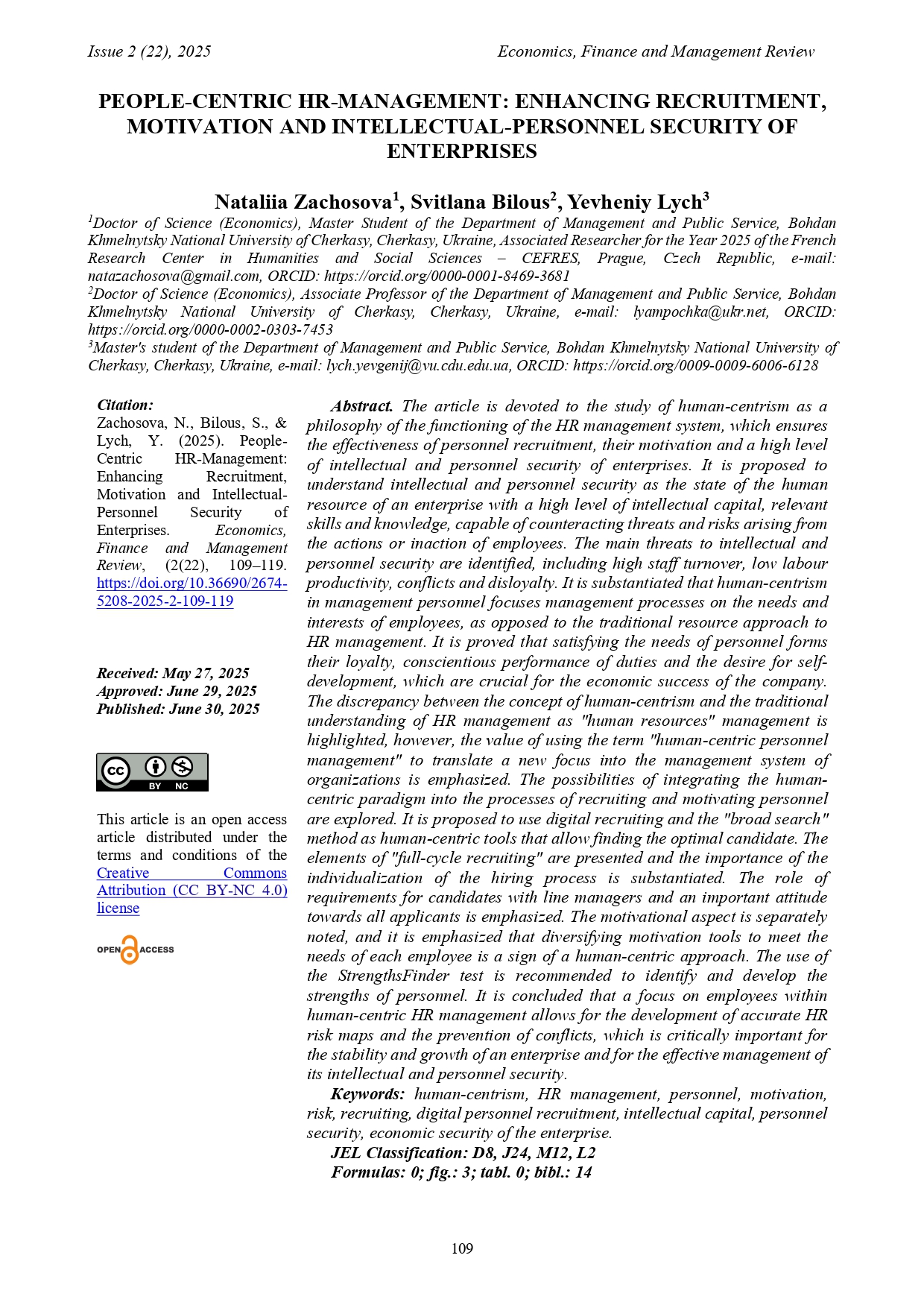PEOPLE-CENTRIC HR-MANAGEMENT: ENHANCING RECRUITMENT, MOTIVATION AND INTELLECTUAL-PERSONNEL SECURITY OF ENTERPRISES
DOI:
https://doi.org/10.36690/2674-5208-2025-2-109-119Keywords:
human-centrism, HR management, personnel, motivation, risk, recruiting, digital personnel recruitment, intellectual capital, personnel security, economic security of the enterpriseAbstract
The article is devoted to the study of human-centrism as a philosophy of the functioning of the HR management system, which ensures the effectiveness of personnel recruitment, their motivation and a high level of intellectual and personnel security of enterprises. It is proposed to understand intellectual and personnel security as the state of the human resource of an enterprise with a high level of intellectual capital, relevant skills and knowledge, capable of counteracting threats and risks arising from the actions or inaction of employees. The main threats to intellectual and personnel security are identified, including high staff turnover, low labour productivity, conflicts and disloyalty. It is substantiated that human-centrism in management personnel focuses management processes on the needs and interests of employees, as opposed to the traditional resource approach to HR management. It is proved that satisfying the needs of personnel forms their loyalty, conscientious performance of duties and the desire for self-development, which are crucial for the economic success of the company. The discrepancy between the concept of human-centrism and the traditional understanding of HR management as "human resources" management is highlighted, however, the value of using the term "human-centric personnel management" to translate a new focus into the management system of organizations is emphasized. The possibilities of integrating the human-centric paradigm into the processes of recruiting and motivating personnel are explored. It is proposed to use digital recruiting and the "broad search" method as human-centric tools that allow finding the optimal candidate. The elements of "full-cycle recruiting" are presented and the importance of the individualization of the hiring process is substantiated. The role of requirements for candidates with line managers and an important attitude towards all applicants is emphasized. The motivational aspect is separately noted, and it is emphasized that diversifying motivation tools to meet the needs of each employee is a sign of a human-centric approach. The use of the StrengthsFinder test is recommended to identify and develop the strengths of personnel. It is concluded that a focus on employees within human-centric HR management allows for the development of accurate HR risk maps and the prevention of conflicts, which is critically important for the stability and growth of an enterprise and for the effective management of its intellectual and personnel security.
Downloads
References
Atakan, K., & Meriç, B. K. (2024). From human resources to people & culture: Advanced analytics of evolving people-centric approaches in Human Resource Management (HRM). In Theory and Practice Management and Organization Studies (pp. 77–91). Peter Lang Publishing Group.
Changrong, J. (2014). Back to "people-centered" management. China Textile and Apparel, 32(2), 50–51.
Dyba, M. I., & Herneho, Yu. O. (2020). Alternatyvni finansovi instrumenty v umovakh rozvytku liudynotsentrychnoho biznesu [Alternative financial instruments in the context of human-centered business development]. Finansy Ukrainy, no. 9, pp. 49-64.
Dzvinchuk, D., Petrenko, V., & Lopushynskyi, I. (2024). Detsentralizatsiia i model liudynotsentrychnoho upravlinnia liudskymy resursamy terytorialnykh hromad [Decentralization and the model of human-centered human resource management of territorial communities]. Publichne upravlinnia ta rehionalnyi rozvytok, no. 26, pp. 1132-1157.
Kolot, A. M., Herasymenko, O. O., Shevchenko, A. S., & Babii, Yu. M. (2023). Ekosystema liudskykh resursiv orhanizatsii yak kontseptolohiia ta prykladna platforma liudynotsentryzmu [Ecosystem of human resources of organizations as conceptology and applied platform of human-centrism]. Problemy ekonomiky, no. 3, pp. 282-294.
Moyo, T., Crafford, G., & Emuze, F. (2021). People-centred management for improving construction workers' productivity in Zimbabwe. Built Environment Project and Asset Management, 11(2), 350–368, https://doi.org/10.1108/BEPAM-02-2020-0029.
Mullins, J., Linehan, M., & Walsh, J. S. (2001). People-centred management policies: A new approach in the Irish public service. Journal of European Industrial Training, 25(3-4), 116–125, https://doi.org/10.1108/EUM0000000005442.
Pandey, S., & Mahesh, J. (2023). Emerging Trends in People-Centric Human Resource Management: A Systematic Literature Review. Vision, 27(3), 323–335, https://doi.org/10.1177/09722629231182853.
Riktor, T. L. (2024). Liudynotsentrychna model ekonomiky pidpryiemstv: yii innovatsiini aspekty [Human-centered model of enterprise economics: its innovative aspects]. Visnyk pisliadyplomnoi osvity. Seriia: Sotsialni ta povedinkovi nauky. Seriia: Upravlinnia ta administruvannia, no. 28, pp. 272-290.
Shakhno, A. Yu., Astafieva, K. O., Temchenko, H. V., & Bondarchuk, O. M. (2021). Mekhanizm zabezpechennia zasad "liudynotsentrychnosti" u protsesi upravlinnia personalom pidpryiemstva [Mechanism for ensuring the principles of "human-centeredness" in the process of enterprise personnel management]. Ekonomika ta derzhava, no. 3, pp. 77-82.
Tanchai, W., & Bunnag, K. (2017). Transformation and innovation: People-centric leadership and management to tackle social issues. In Knowledge Creation in Community Development: Institutional Change in Southeast Asia and Japan (pp. 175–201). Springer International Publishing. https://doi.org/10.1007/978-3-319-57481-3_9
Tkachuk, L., & Tkachuk, M. (2022). Humanizatsiia upravlinnia zakladom osvity v umovakh modernizatsii natsionalnoi systemy osvity Ukrainy z pozytsii liudynotsentrystskoho pidkhodu [Humanization of education institution management in the conditions of modernization of the national education system of Ukraine from the perspective of a human-centered approach]. Psykholoho-pedahohichni problemy suchasnoi shkoly, no. 2, pp. 42-48.
Turylo, A. M., Turylo, A. A., & Horska, S. M. (2021). Problemy ekonomichnoho balansovoho rozvytku v koordynatakh "tsinnist liudyny (liudynotsentryzm) – spravedlyvist – efektyvnist” [Problems of economic balanced development in the coordinates of "human value (human-centeredness) – justice – efficiency"]. Visnyk Kryvorizkoho natsionalnoho universytetu, no. 52, pp. 49-54.
Verbova, O. S., & Verbova, R. M. (2024). Liudynotsentrychne upravlinnia personalom ukrainskykh pidpryiemstv yak protydiia vyklykam voiennoho chasu [People-centric personnel management of Ukrainian enterprises as a counteraction to wartime challenges]. Istoriia narodnoho hospodarstva ta ekonomichnoi dumky Ukrainy, no. 57, pp. 402-425.

Downloads
Published
How to Cite
Issue
Section
License

This work is licensed under a Creative Commons Attribution-NonCommercial 4.0 International License.








